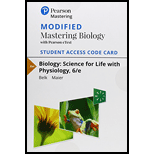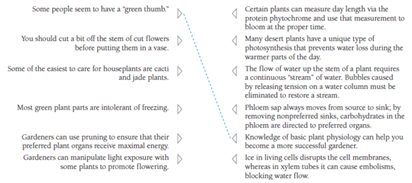
EP BIOLOGY:SCIENCE F/LIFE...-MOD.ACCESS
6th Edition
ISBN: 9780134839530
Author: BELK
Publisher: PEARSON CO
expand_more
expand_more
format_list_bulleted
Concept explainers
Textbook Question
Chapter 26, Problem 1MTC
The science that you learned in this chapter has helped you better understand the real-world example used throughout this discussion. Draw a line from the statement on the left to the science that supports it on the right.

Answers to Got It?, Visualize This, Working with Data, Sounds Right, But Is It?, Show You Know, and Chapter Review questions can be found in the Answers section at the back of the book.
Expert Solution & Answer
Want to see the full answer?
Check out a sample textbook solution
Students have asked these similar questions
Please help me with this question ?
State the similarity and difference between biology and philosophy. Express your answer in not more than five sentences.
Partway through my first semester in college, I tried drawing and labeling pictures as a study tool, and my grades on multiple choice exams improved. I decided to design an experiment to see if this same trick works more generally. I split up students into two groups in my LIFE 102 class:
Group A were given the PowerPoint slides for lecture and asked to review the material for their weekly quiz based on the lecture notes only.
Group B were given the same PowerPoint slides during lecture and asked to draw the content visible on the slides during lecture in their notebooks.
I asked students to share their notes with me so I could confirm which students drew their own pictures and which students used lecture notes only. Then, I evaluated their quiz grades.
Write an alternative hypothesis and a null hypothesis for my experiment. Then write a prediction for each of these hypotheses.
Label them clearly, as in this structure:
Alternative Hypothesis: [general statement of a phenomenon…
Please assist me because I'm not sure I understand. What are the excellent sentences in this response, and what are the logical flaws, content errors, or outright stupid comments?
What are the main differences between inductive and deductive reasoning in the scientific method?
Inductive reasoning and deductive reasoning are both methods of reasoning, but they are used for different purposes and have different characteristics.
Inductive reasoning is a method of reasoning in which a general principle or conclusion is drawn from specific observations or instances. It is often used in the scientific method to form hypotheses and make predictions. For example, a scientist may observe that a certain type of plant always grows well in a certain type of soil, and from this observation, they may form a hypothesis that all plants will grow well in that soil. Inductive reasoning is considered less certain than deductive reasoning because it involves making generalizations based on limited…
Chapter 26 Solutions
EP BIOLOGY:SCIENCE F/LIFE...-MOD.ACCESS
Knowledge Booster
Learn more about
Need a deep-dive on the concept behind this application? Look no further. Learn more about this topic, biology and related others by exploring similar questions and additional content below.Similar questions
- I have an assignment on a Concept analysis paper. The instructor does not give an outline, any ideas?arrow_forwardFor this assignment, you will work in groups of threes to provide an oral critique of a student’s topic-to-sentence outline and a body paragraph, create a revised formal topic-to-sentence outline and a mini essay [containing an introductory paragraph, 1 body paragraph and a concluding paragraph], followed by a Works Cited list, and an annotated bibliography of one source used in the mini essay. Your presentation and mini essay must be based on the following.ContextKaleb was tasked to write a mini essay on one of the following topics:a. Discuss three elements of poor mental health.ORb. What are three groups of diseases among humans?arrow_forwardThe first step research process is to develop your topic or research problem. What is the importance of considering those factors in selecting a research paper?arrow_forward
- Please assist me because I'm not sure I understand. What are the excellent sentences in this response, and what are the logical flaws, content errors, or outright stupid comments? What are the main differences between inductive and deductive reasoning in the scientific method? Inductive reasoning and deductive reasoning are two methods of reasoning that are commonly used in the scientific method. Inductive reasoning involves drawing conclusions based on observations or experimental data. This method begins with specific observations and then attempts to identify patterns or trends, which can then be used to form a general conclusion. For example, if you observed that a sample of 10 apples from a certain tree were all red, you might conclude that all apples from that tree are red, even though you haven't examined all of them. Deductive reasoning, on the other hand, begins with a general principle or hypothesis and then applies it to a specific case. This method uses logical reasoning to…arrow_forwardShare your abstract or a 1-2 paragraph description of your evidence-based paper. Share your dissemination ideas. In this section, you will want to have at least two references. One reference needs to be from the course readings (ie the White or Melnyk texts) and at least one needs to be from your research paper. For discussion, please give each other feedback on your work. This allows each student to receive input on their final paper prior to its due date. In the discussion, you may not have any references. Please write or paste your posting in the discussion box instead of attaching it in a document. Thanks!arrow_forwardHello, Can you please help me to do a 1 paragraph summary of the next article (it's a free article)? https://www.sciencedirect.com/science/article/abs/pii/S0028390817304847?via%3Dihub Thank you in advance!arrow_forward
- What is critical thinking, and why is it important? For the toolbar, press ALT+F10 (PC) or ALT+FN+F10 (Mac). BI U S Paragraph Arialarrow_forwardPlease assist me because I'm not sure I understand. What are the excellent sentences in this response, and what are the logical flaws, content errors, or outright stupid comments? What are the main differences between inductive and deductive reasoning in the scientific method? Inductive reasoning and deductive reasoning are both methods of reasoning, but they are used in different ways in the scientific method. Inductive reasoning involves going from specific observations to a general conclusion. In other words, it involves making a prediction based on limited data. For example, if you observe that a sample of 100 berries from a certain bush are all red, you might inductively conclude that all berries on that bush are red. Inductive reasoning is often used in exploratory research, where the goal is to generate new hypotheses or ideas. Deductive reasoning, on the other hand, involves going from a general principle to a specific conclusion. In other words, it involves deriving a logical…arrow_forwardWhat are the benefits of hospital formulary? Please answer at your own easy words. Answer should be to the point.arrow_forward
- I checked all the boxes for my answer and apparently that's incorrect?arrow_forwardBased on your observation and knowledge, what is the most important problem faced by the human being ? A disease, daily life issues, social issues etc (anything is possible!).Please define your research question or problem. Propose your solution with engineering or scientific approach. Use your imagination and innovative approach.arrow_forwardCan you help me, discuss this following Nature of Pragmatism/Experimentalism in the Philosophy of Education: a. Encourage people to find processes that work in order to attain desired goals. b. the doctrine that practical consequences are the criteria of knowledge, meaning and value.arrow_forward
arrow_back_ios
SEE MORE QUESTIONS
arrow_forward_ios
Recommended textbooks for you
- Case Studies In Health Information ManagementBiologyISBN:9781337676908Author:SCHNERINGPublisher:Cengage
 Comprehensive Medical Assisting: Administrative a...NursingISBN:9781305964792Author:Wilburta Q. Lindh, Carol D. Tamparo, Barbara M. Dahl, Julie Morris, Cindy CorreaPublisher:Cengage LearningEssentials Health Info Management Principles/Prac...Health & NutritionISBN:9780357191651Author:BowiePublisher:Cengage
Comprehensive Medical Assisting: Administrative a...NursingISBN:9781305964792Author:Wilburta Q. Lindh, Carol D. Tamparo, Barbara M. Dahl, Julie Morris, Cindy CorreaPublisher:Cengage LearningEssentials Health Info Management Principles/Prac...Health & NutritionISBN:9780357191651Author:BowiePublisher:Cengage Human Heredity: Principles and Issues (MindTap Co...BiologyISBN:9781305251052Author:Michael CummingsPublisher:Cengage Learning
Human Heredity: Principles and Issues (MindTap Co...BiologyISBN:9781305251052Author:Michael CummingsPublisher:Cengage Learning

Case Studies In Health Information Management
Biology
ISBN:9781337676908
Author:SCHNERING
Publisher:Cengage



Comprehensive Medical Assisting: Administrative a...
Nursing
ISBN:9781305964792
Author:Wilburta Q. Lindh, Carol D. Tamparo, Barbara M. Dahl, Julie Morris, Cindy Correa
Publisher:Cengage Learning

Essentials Health Info Management Principles/Prac...
Health & Nutrition
ISBN:9780357191651
Author:Bowie
Publisher:Cengage

Human Heredity: Principles and Issues (MindTap Co...
Biology
ISBN:9781305251052
Author:Michael Cummings
Publisher:Cengage Learning
Information Storage and the Brain: Learning and Memory; Author: Professor Dave Explains;https://www.youtube.com/watch?v=PQDiUKwXLVI;License: Standard youtube license